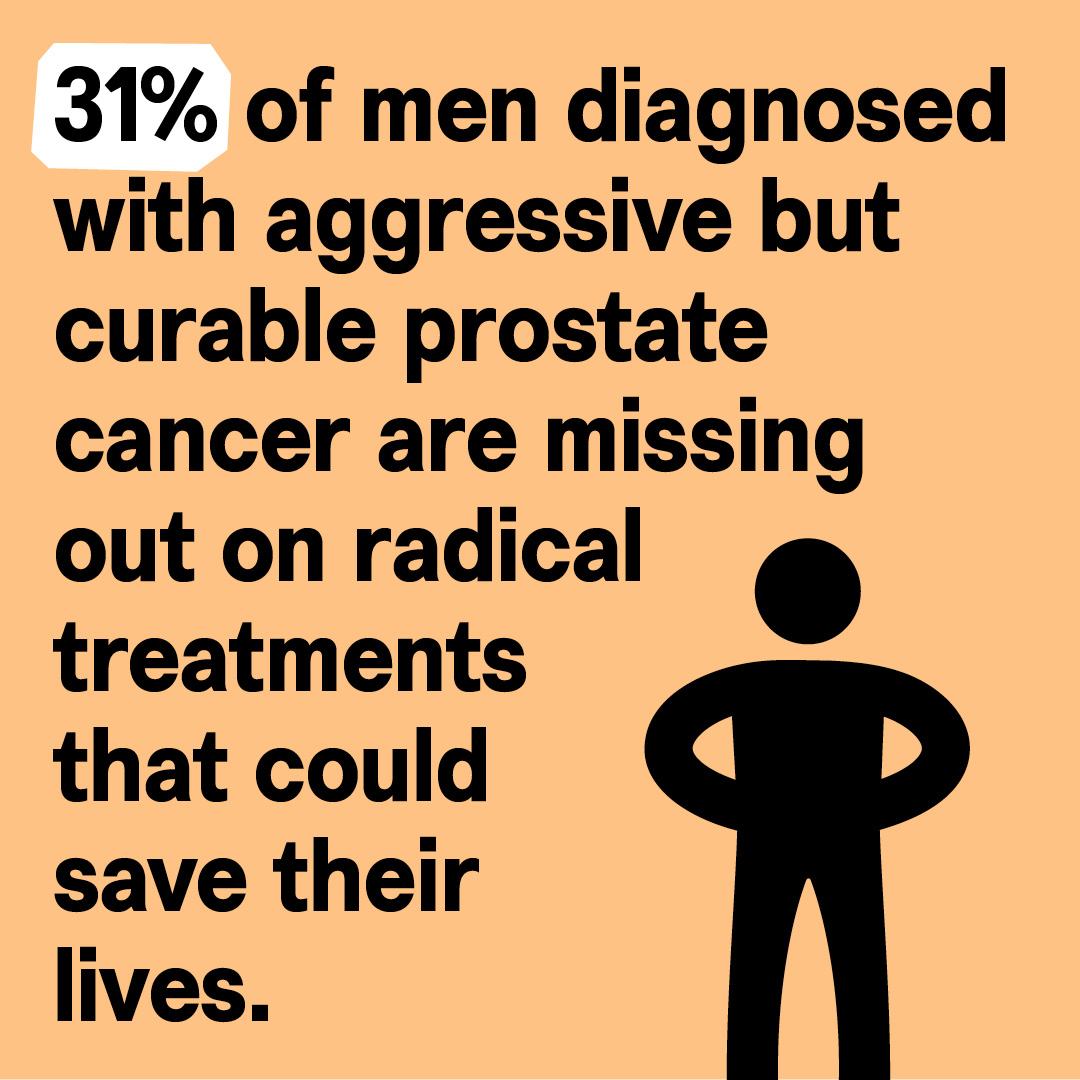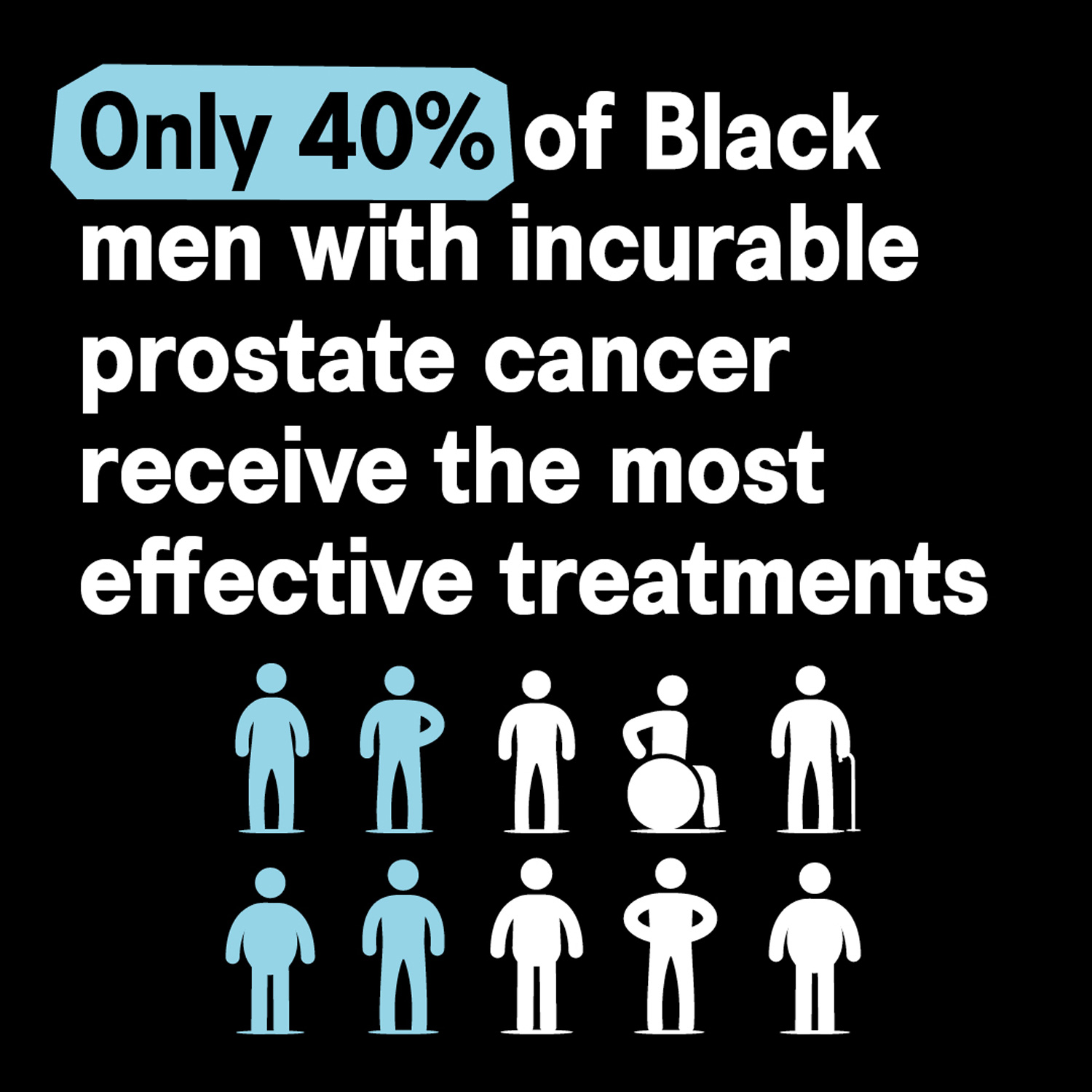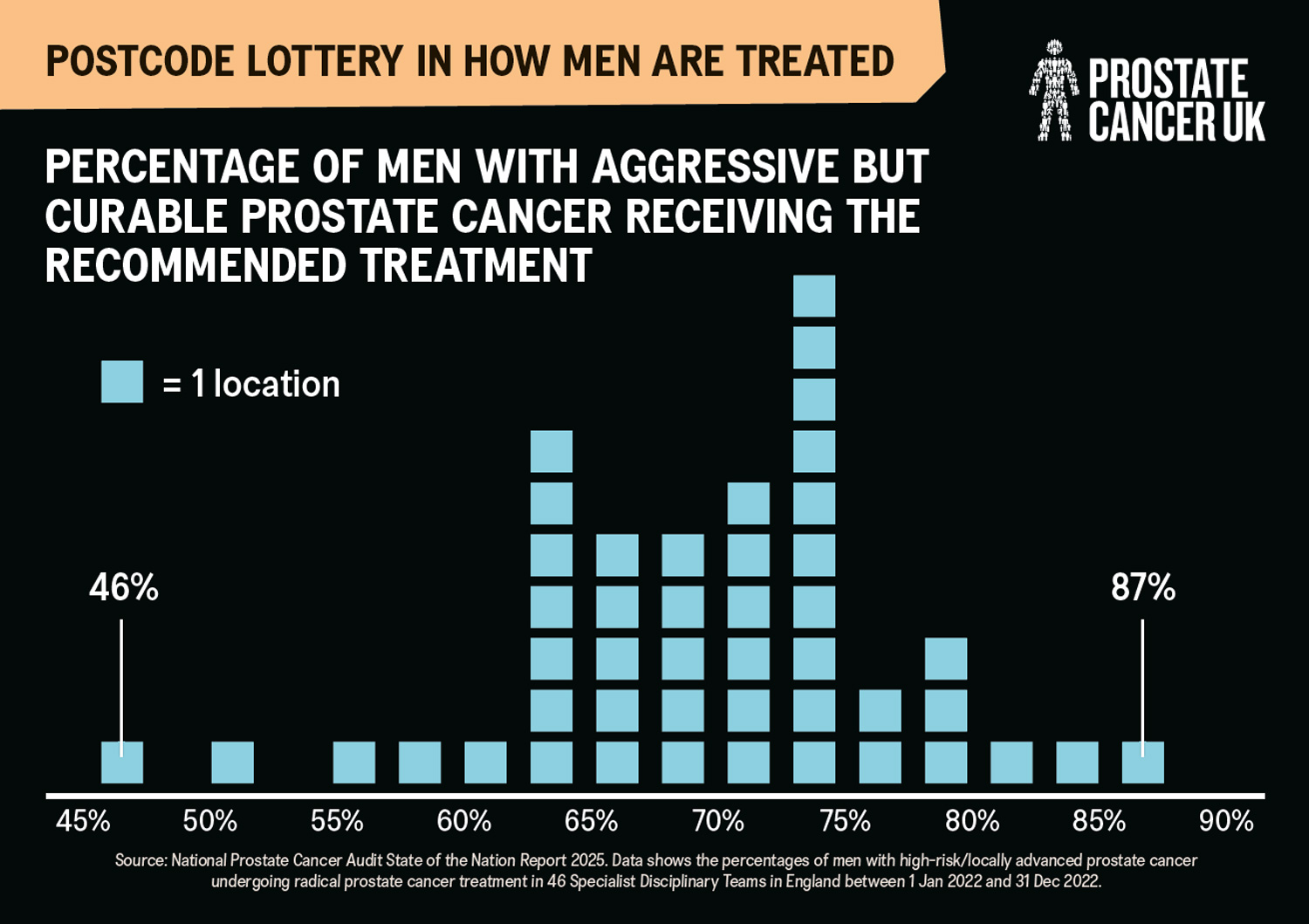Nearly a third of men miss out on lifesaving treatments for prostate cancer – raising to more than half in worst-hit areas
- Prostate cancer can be cured if found early, but 31% of men diagnosed with aggressive but curable prostate cancer are missing out on radical treatments that could save their lives.
- In some areas, more than half (54%) of men with aggressive but curable cancer miss out on these lifesaving treatments.
- Men with incurable prostate cancer are also missing out on years of life, with less than half (47%) receiving the recommended treatments
- Prostate Cancer UK are calling for the Government to prioritise prostate cancer and end the postcode lottery in the upcoming Cancer Plan for England.
Men who could be cured of prostate cancer are seeing their lives left to chance due to a ‘postcode lottery of treatments’, warns Prostate Cancer UK.
The largest public funder of prostate cancer research has released new analysis of National Prostate Cancer Audit (NPCA) data, which shows that nearly a third (31%) of those with aggressive but curable prostate cancer are missing out on treatments that are proven to save lives [12]. In the worst-hit areas more than half of men (54%) are missing out in a tragic postcode lottery, leaving them in danger of dying from the disease.

Men with incurable cancer are also missing out on treatments that could give them years of extra life, with more than half of men nationwide (53%) not receiving recommended treatments [3]. Meanwhile, a shocking 7 in 10 (71%) of over-75s also miss out [4].
Black men and men in deprived areas are both less likely to receive these potentially life-changing treatments for incurable cancer and are diagnosed late at higher rates compared to white men and those in more affluent areas, leaving them at particularly high risk of death.

The charity has long warned that postcode lotteries in diagnosis and care are putting lives at risk. Only half of prostate cancers are caught at the early stages when it’s easier to treat, and Prostate Cancer UK is calling for more action from the Government – including changing guidance so GPs can proactively reach men at highest risk. The charity is also funding the £42 million TRANSFORM trial to develop a screening programme that could be rolled out to men across the UK.
The charity’s warning today is that this additional failure to provide effective and proven treatments simply because of where a person lives is denying thousands of men a fair chance of cure or longer survival.
Chiara De Biase, Director of Health Services, Equity & Improvement, said: “It’s outrageous that in 2025 men are dying of prostate cancer because they are not receiving treatments that should be routinely available on the NHS.
“Thousands of men each year are missing out on care that could give them many more years with their loved ones. And for Black men and those in areas of deprivation the picture is even worse, as they’re more often diagnosed at a later stage, when their cancer can’t be cured and less likely to get the treatments proven to help them live longer.
“This is a matter of life and death. That’s why the Government needs to act now and make sure the National Cancer Plan has measures to make sure these treatments are fairly reaching the men who need them.”
There are legitimate reasons for some men not to receive treatments – for example, if they have other health issues and treating their cancer would be unlikely to extend their life. But new treatments for incurable prostate cancer cause few additional side effects, so these reasons cannot explain the stark differences in men’s access to vital care.
Case study: Colin Tomlinson, 68 from Derbyshire
Colin was diagnosed with aggressive but curable prostate cancer in 2017. Despite his GP's initial hesitation to offer the test – even wtih Colin's symptoms and family history of the disease – he was diagnosed just in time to receive lifesaving treatment that prevented his cancer from spreading.
Colin said: "My wife and I didn't fall apart when we got the news that I had aggressive prostate cancer – in fact, the only time we cried a little was with relief when my consultant informed us he had captured all the tumour and the tests showed there was no sign of any spread of the cancer!
"I consider myself one of the lucky ones, because thanks to his incredible work I've been given a second chance. I sold my business, took early retirement and even took up photography – none of which would have been possible without the radical treatment that saved my life.
"It's awful to hear that there are so many men in my position who aren't being given that chance. There's simply no excuse, and I'm joining Prostate Cancer UK to call on the Government to act now and make sure no-one in my position misses out on treatments that could save them."
Dr Amarnath Challapalli, Consultant Clinical Oncologist and Clinical Director of Bristol Haematology and Oncology centre, said: "While it's heartening to see more men with advanced prostate cancer being offered the most effective treatments compared to previous years, the overall proportion is still inadequate. These novel hormone treatments for advanced prostate cancer are proven to be effective treatments. It is therefore our responsibility as healthcare professionals to ensure each man is offered the optimum treatment based on his overall health and fitness - not just his age - to make sure he receives the best possible care."
Laura Kerby, Chief Executive at Prostate Cancer UK, said: “It’s incredibly disappointing to see the same unfair patterns again and again – men are being denied years of life simply because of where they live, their ethnicity or their age.
"These inequalities are unacceptable, and while the Government has the power to change them, it can only do that if it makes prostate cancer a genuine priority. A robust early detection plan must be built into the new National Cancer Plan to end this postcode lottery once and for all and ensure every man has an equal chance to survive.”
Prostate Cancer UK is the UK’s biggest public funder of prostate cancer research, powering cutting-edge trials like TRANSFORM to revolutionise testing, treatment and care to ensure no man’s life, no matter where they live, is left to chance. Donate to groundbreaking research today: prostatecanceruk.org/chance
Any man who is concerned about his treatment for prostate cancer should speak to his clinical care team. They can also contact Prostate Cancer UK’s Specialist Nurses on 0800 074 8383, or via email, webchat or WhatsApp at prostatecanceruk.org/nurses.




